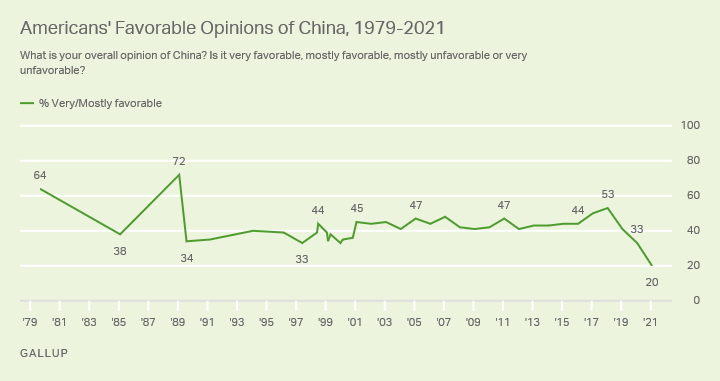A new Gallup poll conducted in the United States revealed that favorability ratings of China dropped to a record low of 20 percent in 2021, sliding down 13 points from a year ago. The latest results were part of an annual survey measuring U.S. attitudes about major world countries. Views on China among respondents ranked the third lowest, surpassing only Iran and North Korea, which only recorded 13 and 11 percent favorability, respectively.
Gallup has tracked Americans’ favorable opinions of China since 1979 when Beijing and Washington forged official diplomatic ties. The U.S. public’s view of China has long been mixed. Positive views of China have only hit majority levels three times, in 1979 at 64 percent, in 1989 with a record high of 72 percent, and in 2018 at 53 percent. Despite the favorability peak in the late 1980s, the Tiananmen massacre in June 1989 in many ways decimated how China was viewed around the world. Within a year, U.S. favorability plummeted to 34 percent, amounting to a 38 point drop.

The overall hardening toward China by the American public cuts across party lines, though Republicans still hold more negative views on China. In the latest poll, Republican’s favorable rating of China fell from 13 to 10 percent, while Democrats’ ratings dipped 8 points from 35 to 27 percent.
These latest survey results echo findings from other recent polls. A separate poll from the Pew Research Service, also released this week, found Americans view China negatively across the board on a variety of issues, from human rights to technology competition to even the presence of Chinese students in U.S. universities.
The downturn is not unique to the United States, either. In fall 2020, the Pew Research Service’s Global Attitudes Survey revealed that growing number of publics’ unhappiness not only with China, but with Chinese leader Xi Jinping specifically. Unfavorable attitudes toward China have climbed swiftly under Xi’s leadership and against the backdrop of the global spread of the coronavirus. According to the Pew results, unfavorable ratings hit 73 percent in the United States compared to 81 percent in Australia, 74 percent in the U.K., and 73 percent in Canada.
U.S. ratings of no confidence in Xi Jinping climbed from 50 percent in 2019 to 77 percent in 2020 – a trend that was shared by many other advanced economies including France, Sweden, and Asian neighbors Japan and South Korea all saw more than 80 percent ratings of no confidence in Xi doing the right thing in foreign affairs.
In August, a poll conducted by data intelligence firm Morning Consult found more than half of survey respondents viewed China as a “major threat” to U.S. technology and innovation dominance. Another recent study from the DC-based Center for Strategic and International Studies found that 50 percent of young Americans 18-30 year olds believe war with China is likely, while an additional 15 percent believe it to be inevitable. Separately, in 2019, the Chicago Council on Global Affairs reported that 63 percent of its respondents saw the United States and China as “mostly rivals.” This was the first time since the question was added in 2006 that a majority qualified the dynamic between the two as a rivalry.
These trends reflect a marked shift from where attitudes toward China were just six or seven years ago. In 2014, Americans under 30 overwhelmingly favored strengthening economic relations with China with 72 percent of the age group wanting improved economic links compared to 51 percent of all respondents. A year earlier, only 22 percent of Americans identified China as a major adversary.
When asked about the recently released Gallup poll, Chinese Foreign Ministry spokesperson Wang Wenbin referenced separate polling that suggested the importance of people-to-people and cultural exchanges between the two countries and support for joint cooperation on climate governance. He blamed the former Trump administration and “anti-China forces” for “maligning” China and “poisoning” public opinion. “We hope the United States will view China and China-U.S. relations in an objective and rational light… and do more to promote mutual trust and cooperation, so as to help bring bilateral relations back onto the track of sound and steady development,” Wang added.
Following remarks this week by U.S. Secretary of State Antony Blinken, Wang said that “in the end, dialogue and cooperation is more palatable than antagonism and confrontation,” speaking of the trajectory of U.S.-China relations.
The plunge in positive attitudes toward China in the United States mirrors a similar change in tenor among policymakers and analysts. While some of the decline in two-way relations is likely a product of the narrative of the coronavirus and the former Trump administration’s “tough on China” stance, public opinion does not necessarily take its cues from the positions of political leaders. The views of domestic audiences can also sway and shape political discourse, especially as foreign policy issues are increasingly linked to everyday lives. “In short, it is no longer politically wise to characterize China as a partner or friend,” wrote Justin Conrad, director of the Center for International Trade and Security at the University of Georgia for The Diplomat. Managing pressures from thought leaders and a public with increasingly averse attitudes toward China will be a difficult task if the Biden administration is to avoid further fraying Beijing-Washington relations.

































